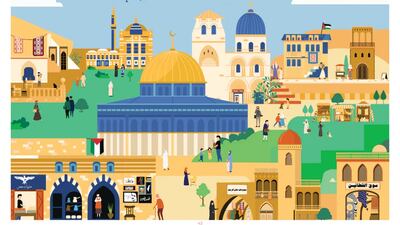With global headlines still dominated by the war in Gaza, author Deema Al Alami's latest children's book takes on a different approach to the ongoing tragedy in her homeland.
With a deeply rooted commitment to preserving history and advocating for justice, Al Alami has curated 48 Stories of Exile from Palestine, a collection that offers readers a window into the experiences of Palestinians throughout generations of displacement and exile.
Al Alami's inspiration to create the book came from witnessing the realities of Palestinians striving for basic human rights since the Nakba in 1948.
One particular recent story, that of a Palestinian woman named Hajjeh Hadya Nassar in Gaza, struck a chord with Al Alami and ignited the idea for the book.
“Despite being injured because of an airstrike and being displaced twice, her unwavering love for her land and her people radiated from her,” Al Alami says. "It struck me profoundly that preserving the stories of our elders, like Hajjeh Hadya Nassar, is essential as they hold the truths of events like the Nakba. Witnessing her resilience and love amid such horrible circumstances inspired me to channel my feelings of despair, helplessness and anger into my love of storytelling."
The title holds immense significance, particularly concerning the year 1948, marked by the devastating Nakba where 750,000 Palestinians were displaced from their homes, including the author’s paternal grandparents.
“Although they found refuge in Jordan, their longing to return to Jerusalem permeated every aspect of their lives until their passing decades later,” she explains.
Known for writing a variety of Arabic children’s books to preserve the region’s native language, Al Alami decided to take a different approach for her latest book and produce it in English. “Upon reflection, I recognised that the significance of this book extends beyond linguistic boundaries, it embodies a universal message that transcends my personal attachment to our Arabic culture,” Al Alami says.
The 104-page book, detailing 48 poignant tales, originated from Al Alami's call for stories on Instagram. She teamed up with co-producer Nahla Al Malki and a team of five editors led by Fatima AlSaad, who enacted a meticulous verification system to ensure the book's accuracy and inclusivity.
Al Alami adds that this experience took an emotional toll on her, “as each story resonated deeply with me, given my own family’s history of exile from Palestine". She adds: "However, this emotional investment fueled my determination to reclaim Palestinian narratives from erasure and marginalisation.”

Al Alami hopes the book helps readers of all ages recognise Palestinian humanity and their shared experiences of love, loss, and resilience.
“I hope that these stories will inspire readers to delve into their own research about Palestine, relying on credible sources, particularly those from Palestinian perspectives," Al Alami says. "Understanding the history of Palestinians cannot be achieved solely through the narratives of the West. I want the world to know about Palestinian lives, not just their deaths. Our lives are rich; we come from different religions, cities, villages, but we all share a deep love for our land.”
The project embodies a community endeavour, with more than 60 people contributing their talents pro bono, such as graphic designers and illustrators. This diverse collaboration underscores the universal significance of the Palestinian struggle for freedom, she says, uniting voices from various backgrounds in solidarity.
Al Alami says: “Each story resonated deeply with me. Despite the fact that we have reviewed, edited and read each story multiple times, I would cry or laugh or be inspired every single time. Fathers in these stories become like my own father, and grandmothers like my own grandmother.”
The book was published in Jordan, with the entire first batch being given to the Palestine Children’s Relief Fund. She adds: “I hope that PCRF will be able to provide these children with essential resources and support, offering them a better chance at leading dignified and fulfilling lives despite the horrible experiences they endured.”
In 48 Stories of Exile from Palestine, Al Alami aims to not only preserve ancestral narratives but ignite a movement of empathy, understanding and action. Through storytelling, she invites readers to join in the journey toward justice, equality, and peace for Palestinians.

